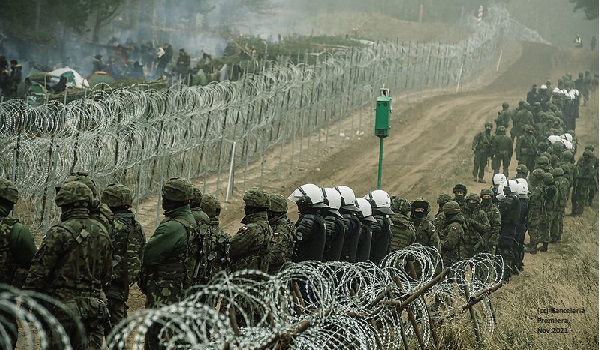Poland has blocked a compromise proposal on EU legal measures to assist Poland, Latvia and Lithuania, insisting on the complete suspension of asylum. Construction has begun on a 353 million-euro Polish border wall that has been condemned by environmentalists and human rights activists alike. Dire reception conditions in EU border states have led a child to hunger strike. Poland says it would welcome a million or more Ukrainian refugees, in sharp contrast to the hostile approach taken to Afghans, Iraqis and Syrians arriving at the border.
A compromise proposal on the Council Decision on provisional emergency measures for the benefit of Latvia, Lithuania and Poland, presented by the French presidency of the Council, has been rejected by Poland. The measures previously came under fire from MEPs and NGOs, who deem the proposal to have a disproportionate and severe impact on fundamental rights. For Poland however, the proposal did not go far enough, and should have permitted the complete suspension of EU asylum rules on the basis of public or national security threats. Poland admitted this would be a “far-reaching change” but justified it in light of “a hybrid attack in the form of the instrumentalisation of desperate people by a hostile regime”. Poland opposed the compromise proposal as it required cooperation with the UN Refugee Agency (UNHCR) and for the resumption of asylum procedures after a certain delay.
A 353 million euro, 186km border wall currently under construction by Poland will have a catastrophic environmental impact, according to a coalition of NGOs. In a petition to the European Commission they say the wall will: “destroy the unique nature, harm local communities and will not solve the humanitarian crisis”. Militarisation of the border since August has caused immense human suffering and cost a minimum of 21 lives. The 5.5. metre wall also generates ecological concerns, as it cuts though Europe’s last old-growth forest, a fragile ecosystem home to European bison and other endangered species. UNESCO has called for the construction to be halted until proper environmental impact assessments are carried out. Anna Alboth, from Minority Rights Group and Grupa Granica says the decision to build the wall is: “not only lawless but also brings a risk of irreversible harm to the environment”. Further, the budget for the wall – equipped with motion detectors and thermal cameras – is ten times the entire 2022 budget of Poland’s migration department. “This money could be used to build and launch [an] effective and humane migration, reception and asylum policy,” said the Ocalenie Foundation, which supports refugees in Poland. The construction is planned for completion by June 2022. Lithuania has also said it will install cameras along the entirety of its border with Belarus, at a cost of 40 million euro.
Reception conditions for the asylum seekers that reached Poland, Lithuania and Latvia since the summer remain dire. A 13-year-old from Iraq has been on hunger strike for several weeks to protest the poor conditions in Polish centres. The girl, who has been held at the Biala Podlaska centre, likens it to a prison. A psychologist monitoring the centre concurs, describing how: “a 9-year-old girl told me during one of the visits that she did not want to live”. In Lithuania, asylum seekers describe the interviews conducted by asylum officials as a “charade”, with negative responses automatically handed out. One Guinean man said he was forced to do the entire interview in handcuffs, without access to a lawyer. Latvia meanwhile has decided to extend the state of emergency at the border until 10 May.
Poland’s deputy interior minister says the country “will not run away” from its international obligations to Ukrainian refugees if there is war in the neighbouring country. Since August 2021, Poland has been accused of failing to assist thousands of victims of Belarussian “instrumentalisation”, mostly originating from Iraq, Syria or Afghanistan. Instead of providing fair and effective asylum procedures, Poland branded these people a “hybrid threat” and conducted violent pushbacks. Yet, in regards to the situation in Ukraine, minister Maciej Wąsik said: “Where there are indeed refugees, we must help them, this is international law […]”. The Slovakian defense minister, Jaroslav Naď, also announced his intention to grant protection to displaced Ukrainians in the event of major conflict. Poland claims to have hosted “15,000 political refugees” from Belarus in 2021. During the same year, over 1,800 asylum claims were submitted by Afghans, of which only 750 were granted.
For further information:
- ECRE, EU Eastern Borders: Interior Ministers Want to Beef Up ‘Protection’ of Borders, Lithuania Fines MSF Medics, Court Backs Red Cross in Polish Border Zone, Ombudsman Finds Polish Reception Insufficient, January 2022
- ECRE, EU Eastern Borders: Commission Emergency Proposal Comes Under Fire, MEPs Visit Rights-Free Border Zone, Supreme Court Rules on Polish Media Ban, January 2022
Photo: (cc) Kancelaria Premiera, 11 November 2021
This article appeared in the ECRE Weekly Bulletin. You can subscribe to the Weekly Bulletin here.

